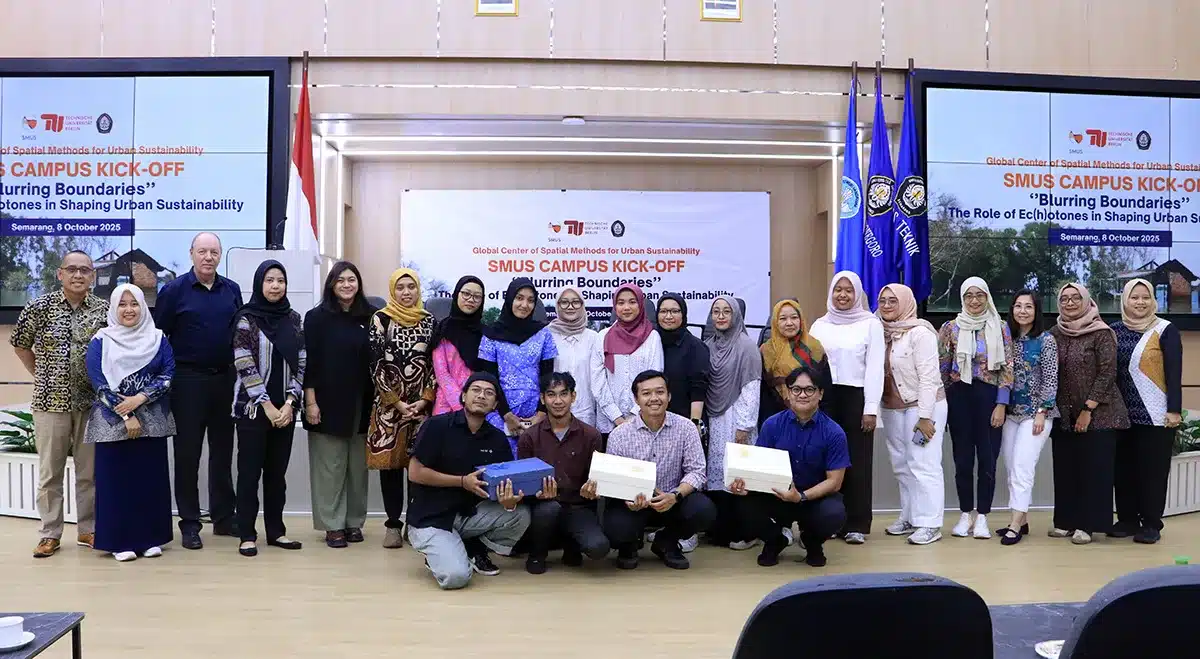UNDIP, Semarang (October 8, 2025) – The Department of Urban and Regional Planning, Faculty of Engineering, Universitas Diponegoro (DPWK FT UNDIP), in collaboration with Technische Universität Berlin, held an academic event titled “SMUS Campus Kick-Off: Blurring Boundaries – The Role of Ec(h)otones in Shaping Urban Sustainability.” The event was part of the Multidisciplinary Learning Series under the Global Center of Spatial Methods for Urban Sustainability (SMUS) network. Conducted in a hybrid format, it was attended by hundreds of students from various UNDIP faculties, as well as from other universities such as Unissula and USM.
The event opened with remarks from the Head of the Department of Urban and Regional Planning, Prof. Dr.-Ing. Wiwandari Handayani, S.T., MPS, who also served as the local person-in-charge (PIC). She emphasized the importance of interdisciplinary approaches in understanding and responding to urban challenges, particularly in coastal regions.
“SMUS is expected to become a networking platform that facilitates dialogue, collaborative research, and teaching and learning processes on sustainable urban planning practices,” she explained, while also noting that the SMUS network can be accessed via www.gcsmus.org.
Representing the Dean of the Faculty of Engineering, Prof. Ir. Nita Aryanti, S.T., M.T., Ph.D., IPM, Vice Dean for Academic and Student Affairs, expressed her appreciation, stating that the event would bring tangible benefits by strengthening multidisciplinary collaboration among academics, practitioners, students, and relevant stakeholders.
“Through collaboration, research and development practices will continue to grow. This activity will enrich evaluation perspectives and strengthen academic contributions toward realizing sustainable cities in Indonesia,” she said, adding that the program serves as a platform for exchanging ideas, generating innovations, and shaping strategic policies.
Before the main session began, Prof. Dr.sc.agr. Iwan Rudiarto delivered a presentation on the concept of ecotones. He explained that an ecotone is a transition area between two ecosystems, characterized by dynamic socio-ecological interactions and strategic issues. The Ec(h)otone Project, he added, serves as a forum for multidisciplinary collaboration across various fields. This conceptual explanation provided a foundation for the subsequent panel discussions. The main session featured presentations by student research groups, based on their field observations of life and adaptation in Demak’s coastal areas.
Three studies were presented:
- Blue-Green Approach for Coastal Ecotone Area
- Living at the Edge of Change: Sayung Ecotone Futures
- Ecotone Transformation in Coastal Cities
These were the results of field studies conducted by three student groups in Demak’s coastal regions as part of the program.
Prof. Dr. Walter Timo de Vries from the Technical University of Munich provided feedback on the research presentations. “I appreciate Group 2 for presenting data clearly and comprehensively. All three groups also included video visualizations that effectively illustrated the Demak coastal sites,” he said.
He noted that the presentations effectively depicted the complex issues in Demak’s ecotone areas, supported by compelling visual footage showing residents’ daily adaptations—such as floating house innovations and bridge connections between homes—to address environmental challenges like coastal abrasion and rising sea levels.
Meanwhile, Anisa Fitria, Head of the Science and Technology Division at the German Embassy in Jakarta, highlighted that ecotones can serve as spaces for meeting, exchange, and adaptation. “The cooperation between Indonesia and Germany will continue to grow in addressing global challenges. The German Embassy highly values this collaboration,” she stated. Another perspective came from Pramudita Mahyastuti of GIZ Indonesia, who explained that GIZ’s Integrated Land and Sea Landscape Management Program closely aligns with the ecotone concept.
The event not only served as an academic forum but also as a catalyst to promote adaptive urban planning practices. The multidisciplinary approach to understanding ecotones as dynamic socio-ecological interaction spaces is expected to open new opportunities for innovation in addressing urbanization and climate change challenges—aligning with the Sustainable Development Goals (SDGs), particularly SDG 11 (Sustainable Cities and Communities) and SDG 13 (Climate Action).
This initiative embodies the spirit of “Noble and Valuable UNDIP” through its tangible contributions to the nation, characterized by knowledge, innovation, and integrity. The SMUS Campus Kick-Off concluded with an interactive discussion and a group photo session symbolizing ongoing collaboration between Indonesian and German academia. (Public Communication/UNDIP/Riri)










